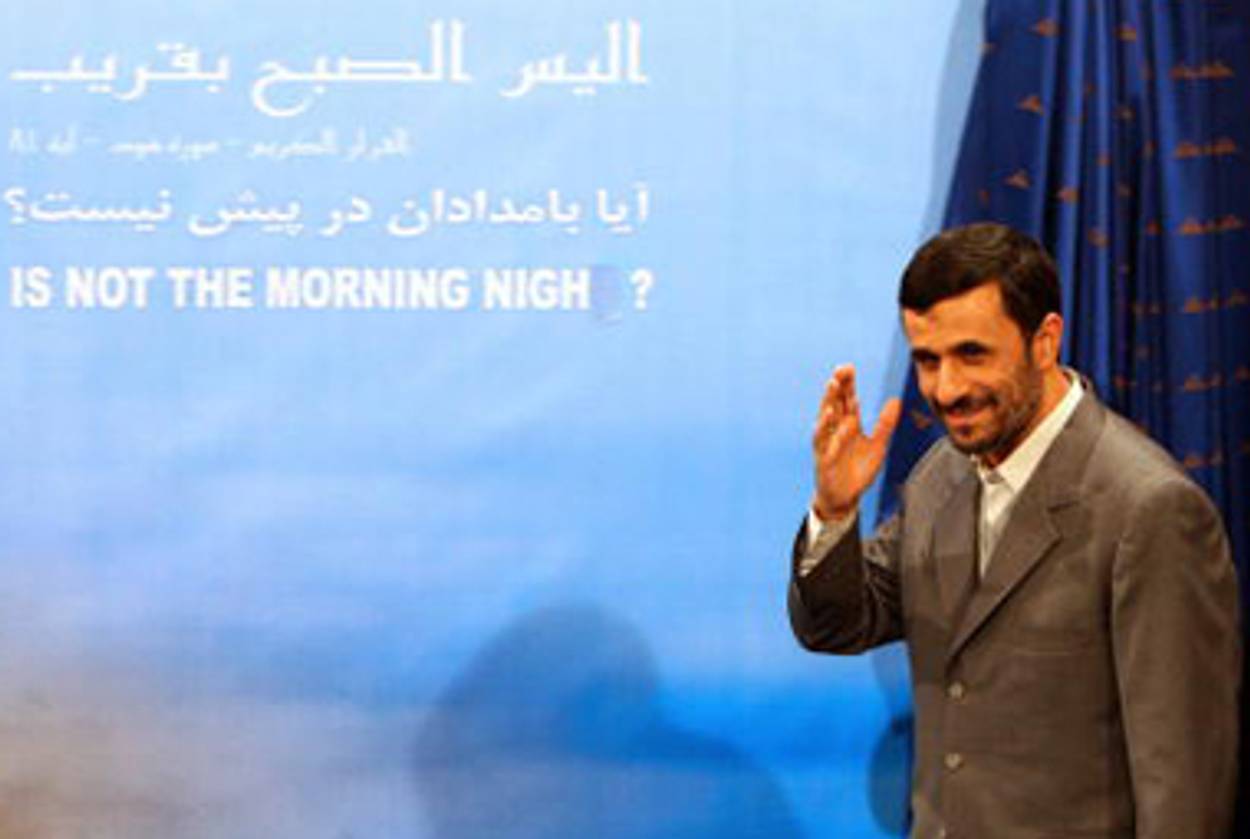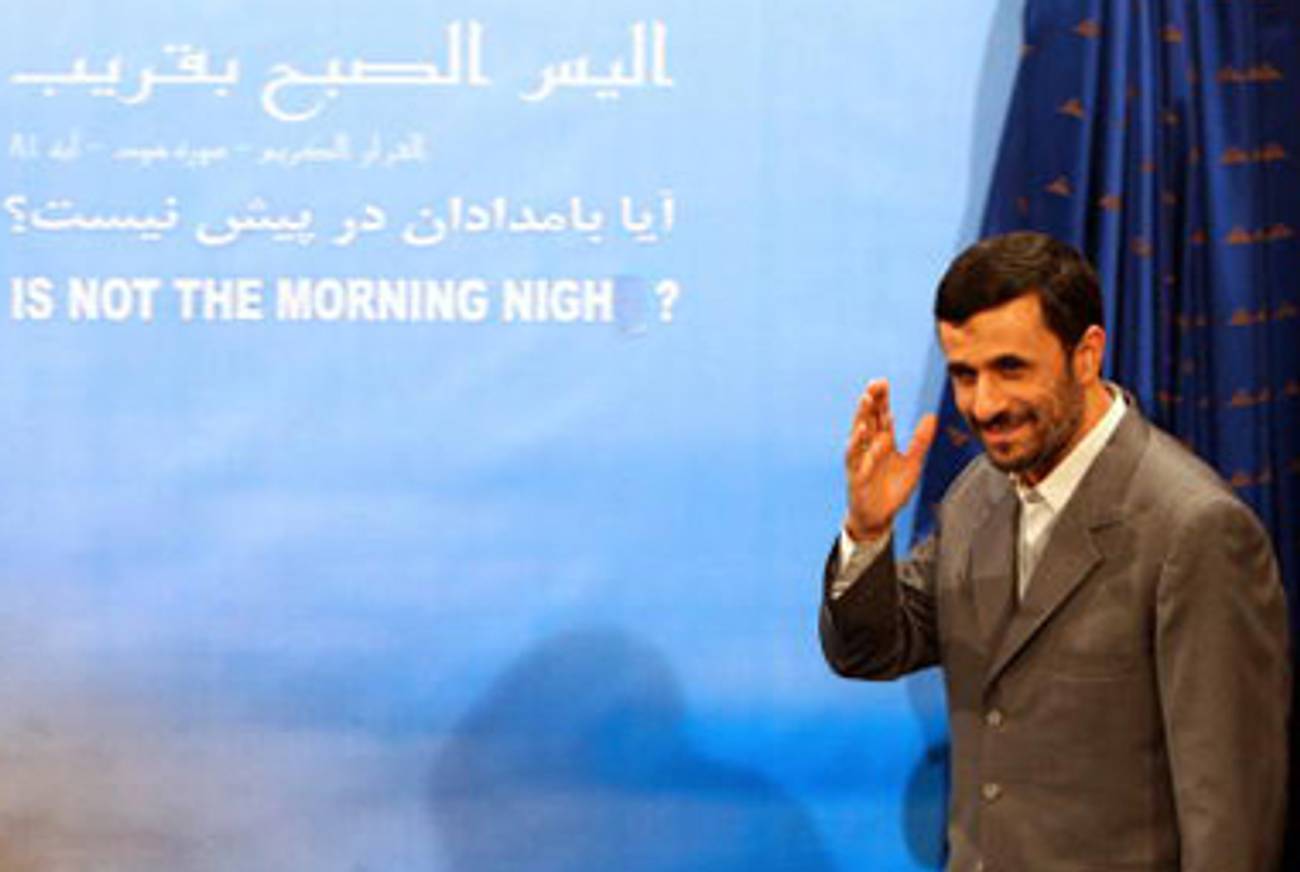Trial and Error
Studying the 1961 Adolf Eichmann trial provided a reminder that it’s always crucial to confront Holocaust denialism, whether among Nazis in the immediate postwar years or from Mahmoud Ahmadinejad today




A few months ago, as I was finishing my book on the Eichmann trial, a friend asked me, “What do you know now that you did not know before you began your work?” I launched into a discourse on the various details of this fascinating trial. Before I could get too far, he stopped me. “No, I’ll read the book to get the story. Instead tell me what you now know in your gut that you did not know before.” He paused for a second and then added, possibly aware that it was a strange question to ask a scholar about a topic to which she has devoted an extended period of time and effort: “What’s the bottom line?”
Feeling a bit flummoxed at the request that I pare a couple of years of research and a complex legal proceeding down to something akin to a sound bite, I found myself momentarily and uncharacteristically at a loss for words. Did my interlocutor think that everything—including scholarship—could be reduced to an answer that would fit in a Twitter post?
As I tried to formulate a short but nonetheless nuanced answer, my friend popped up with another question: “And how does the Eichmann trial relate to all those years you have spent studying and fighting Holocaust denial?”
When he asked his second question, I knew the answer to the first.
***
First, some background. When I began my research on the Eichmann trial I told my colleagues and friends that I felt relieved to be dealing with something other than Holocaust denial. First of all, it was nice—if one can use that term in relation to anything associated with the Holocaust—to move on to another topic. When I first wrote Denying the Holocaust, published in 1993, I never imagined that I would become enmeshed in the topic in not just a scholarly way but also in a legal and personal context.
But having a new topic to investigate was not the only reason for my relief. Writing about the Holocaust is always a difficult proposition. One must analyze horrific events and information while maintaining a requisite scholarly distance. Allowing emotions to intrude only distorts one’s scholarship. It is neither easy nor pleasant. Yet when writing about Holocaust denial I was presented with an added discomforting element: I was not just studying a terrifying historical event. My subject was a movement that was alive, kicking, and working vigorously to distort history and inculcate anti-Semitism. There was immediacy to this issue that was not present when I dealt with events that happened seven decades earlier.
I encountered yet one additional challenge in my study of Holocaust denial. Many people consider deniers “nutters,” as the British would say. They dismiss them as the historical equivalents of flat earthers. These same people told me that I was making a mistake in taking deniers seriously. As I began my work many of my colleagues in the field of Holocaust studies told me that this topic was not worth my time. They said quite bluntly: “You are writing about crackpots, Deborah. Why bother?” In response I explained, generally to no avail, that, while I did not think deniers a clear and present danger, I did think that they were a potential future danger and that therefore it was important that we understand their modus operandi. Furthermore, I thought it crucial that the world recognize the inherent anti-Semitism girding their entire enterprise. Some of them may be nutters, but they are Jew-hating ones. As survivors die and the option of hearing about the Final Solution in the first person singular fades, deniers, I feared, would only find it easier to spread their pseudo-intellectual wares. It was important to expose them, their lies, and their tactics.
I encountered the same skepticism a number of years later when I was sued for libel by David Irving. Many people, among them leading scholars, counseled me to ignore the matter. “You should not take his threat seriously,” I was repeatedly told. I chose to ignore their advice. If I did not fight he would have won by default because British libel law puts the burden of proof on the defendant. Once again my explanations were to no avail. “So what if he wins by default?” I was told. “No one takes him seriously, anyway.” (With no sense of irony, some of the same people subsequently congratulated me on my “great victory” against this man and told me that what I did was very important.)
We convinced the court that the “proof” Irving claimed to have to validate his assertions regarding the Holocaust did not prove his claims at all. His arguments were, we demonstrated, a tissue of lies. What then does all this have to do with my work on the Eichmann trial?
***
Thinking about the anti-Semitism, which is the foundation stone of denial and the refusal—denial?—of so many people to take the topic seriously, made the “bottom line” of the Eichmann trial and, by extension, the Holocaust patently clear. It is quite simple and straightforward. Had the world taken Nazi anti-Semitism more seriously from the outset of the rise of the Third Reich the subsequent tragedy might have been quite different.
In the 1930s and 1940s, of course, observers—and the potential victims—could not fathom where Hitler and his cohort’s anti-Semitism might lead. They could, in retrospect, legitimately claim ignorance. Today we do not have that luxury. When anti-Semites speak of their hatred of Jews and their desire to do them harm, we should accept their threats at face value. That does not mean we should panic or declare that the sky is falling at every expression of anti-Semitism. It does not mean that every anti-Semite poses the same potential danger. It does mean that we should not reflexively dismiss anti-Semites as crackpots or the equivalent of flat earthers.
Most of all, the actions of not just Adolf Eichmann but all those who played a role in the Final Solution remind us that we should pay particular heed to threats that emanate from those who have the ability to do real harm. During the past five years we have heard a stream of Holocaust denial, overt anti-Semitism, and threats against Israel emanate from the mouth of Iranian President Mahmoud Ahmadinejad. Many people have dismissed him as a deranged person whose crazy comments are best ignored. Some scholars have gone to great efforts to explain away his threats against Israel. That is to engage in a form of self-delusion, if not denial. Ahmadinejad’s Holocaust denial is linked directly to his animus toward Israel. In 2009, after questioning the existence of the Holocaust, he declared it a ploy used by the Jews to get the West to accede to the creation of Israel. This, of course, comes on top of his infamous Holocaust denial conference in 2006. The Iranian Foreign Ministry, which was an official host of the gathering, made common ground with some of the world’s most infamous deniers and anti-Semites. It offered them a chance to express their animus toward both Israel and the Jews. The conference constituted a virtual Who’s Who of Holocaust deniers and anti-Semites, including Robert Faurisson, one of the leading “theorists” of the movement who lives in Vichy France; Australian Fred Tobin, whose Adelaide Institute is a bastion of denial activities; former Ku Klux Klan leader David Duke; and Bradley Smith, founder of the Committee on Open Debate on the Holocaust, which was responsible for placing a series of ads in college and university newspapers denying the Holocaust. The conference itself followed the Iranian contest on Holocaust-denial cartoons, which had the official imprimatur of Ahmadinejad.
Ahmadinejad did not, of course, introduce Holocaust denial to the Middle East and the Arab/Muslim world. Egypt’s Gamal Abdel Nasser spoke of the “lie of the 6 million Jews.” Mahmoud Abbas, as a young student, wrote a dissertation that was pure denial, though he subsequently repudiated this view, and while I fully believe his repudiation, the fact that as a young man he could have been seduced by this falsehood is telling. Spokesmen for Hamas have also engaged in Holocaust denial. Holocaust denial themes can be found in newspapers in many parts of the Arab world, including in Jordan, Egypt, and Lebanon.
In virtually every other part of the world where Holocaust denial can be found it is relegated to the extreme political fringe. Only in the Middle East can it be found in more legitimate circles. There is no counternarrative to challenge these claims. Young people are growing up convinced that the Holocaust is a myth produced to justify the existence of their enemy, Israel. In Iran, Ahmadinejad’s denial and hatred of Israel are particularly frightening because Iran is close, we are told, to having nuclear weapons. It would be a form of denial—that is, willful blindness—not to recognize the nexus of Iranian leaders’ overt Holocaust denial, threats to destroy Israel, unquestionable anti-Semitism, and possession of nuclear weapons. They are not separate and unrelated phenomena.
Seventy years ago people had an acceptable reason to say, “We could never fathom that Hitler meant what he said.” Today we no longer have that luxury. At the very least it behooves us to take Ahmadinejad and those among his fellow Muslim leaders and opinion-makers seriously. Their Holocaust denial is part of their contemporary political agenda.
Among many other things, that is one of the lessons that both The State of Israel v. Adolf Eichmann and David Irving v. Penguin UK and Deborah Lipstadt taught me. It is what I now know in my gut that I may not have really known before.
Deborah E. Lipstadt, author of Nextbook Press’ The Eichmann Trial, is Dorot Professor of Modern Jewish History and Holocaust Studies at Emory University.
Deborah E. Lipstadt, author of Nextbook Press’ The Eichmann Trial, is Dorot Professor of Modern Jewish History and Holocaust Studies at Emory University. Her Twitter feed is @deborahlipstadt.
Deborah E. Lipstadt, author of Nextbook Press’ The Eichmann Trial, is Dorot Professor of Modern Jewish History and Holocaust Studies at Emory University. Her Twitter feed is @deborahlipstadt.